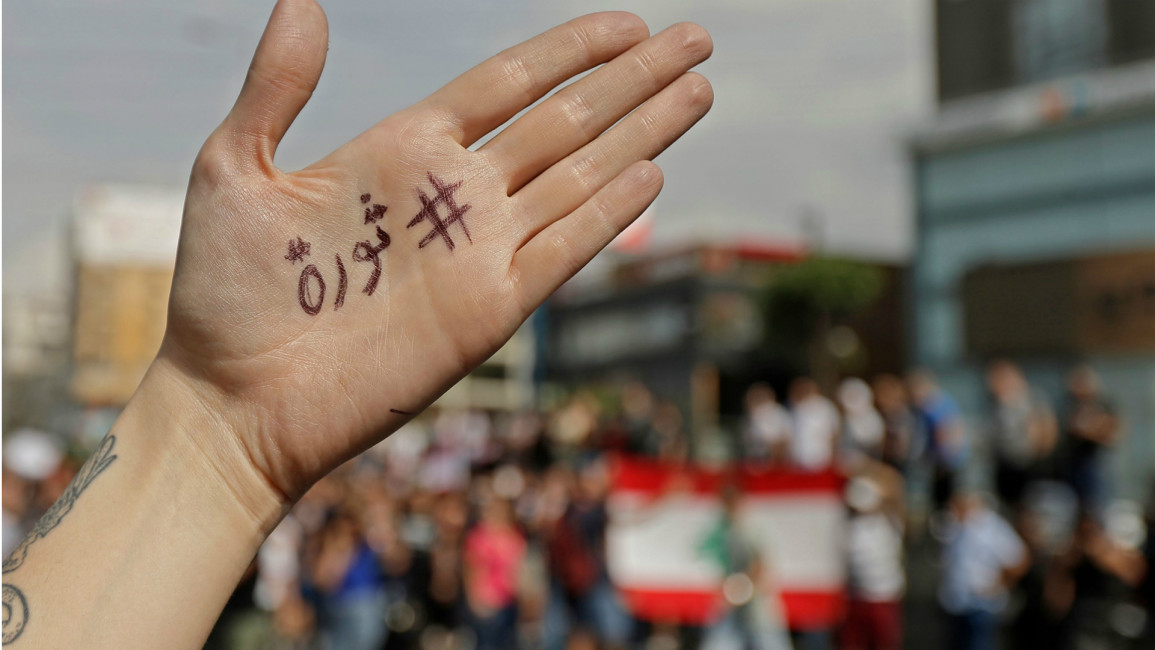Since mass demonstrations started on Thursday, the chortles of tens of thousands have rung out across the country until the late hours of the night.
"The people demand the fall of the regime" - a popular chant from the 2011 Arab uprisings - reigned supreme.
Another slogan - "revolution, revolution" - has also become a favourite among the tens of thousands mobilising against the government, usually accompanied by raised fists.
The ones tailored to specific members of Lebanon's ruling class left no politician unscathed.
In a country where partisan sentiments run high, and divisions run deep along party lines, thousands have chanted "all of them means all of them" to reject an entire political class without exception.
A reiteration of this slogan has also been used to convey that the leader of powerful Shia movement Hezbollah, Hassan Nasrallah, is not excluded from the lot.
"All of them means all of them, Nasrallah is one of them," they chanted, in a rare criticism of the revered leader, who responded on Saturday by saying: "Curse me, I don't mind."
'Not our father'
In a jab to President Michel Aoun, whose supporters have portrayed him as a paternal figurehead, protesters chanted: "leave, leave, leave, you're not everyone's father."
Speaker of parliament Nabih Berri, who has accumulated vast wealth since he assumed his post 27 years ago, was repeatedly called a "thief" by protesters, even in the southern city of Tyre, a stronghold of his Amal Movement party.
Some even mocked his long tenure, with one sign reading: "Who came before Nabih Berri? Adam and Eve."
But Foreign Minister Gebran Bassil appeared to be the favourite target of protesters, even in areas where his Free Patriotic Movement party is popular.
Most chants against Bassil included insults and slurs, many of which were turned into songs and shared widely on social media networks.
Prime Minister Saad Hariri, whose pictures were burnt down in several parts of Beirut and the north, was repeatedly urged to "leave" by protesters.
One sign raised in a Beirut protest touched on reports published last month that the premier had paid $16 million to a South African model.
"We have not forgotten about you, we will come for the 16 million," read one sign bearing a picture of the blonde woman in a bikini.
'Happiest depressed people'
Some of the chants were familiar to those who had participated in anti-government protests in 2015, sparked at the time by a garbage crisis.
"Our government is a government of thugs" and "down with the rule of the thieves" drove home one of the protesters' main grievances - the perceived corruption of the country's leaders.
Mocking Lebanon's political dynasties and handing-down of power from father to son, one protester held up a sign that read: "Electile dysfunction."
Others criticised the heavy-handed response of security forces on the first two days of protests, with one banner reading in English: "Don't throw tear gas we can cry by ourselves."
Many of the signs and slogans espoused cross-sectarian solidarity, in a country riddled with sectarian divisions since the end of the civil war.
"Christians and Muslims for a civil state," was a popular chant.
One banner held up in central Beirut succinctly captured the conflicting emotions of joy and desperation echoed by protests in the country.
"The happiest depressed people you'll ever meet," it read.
Follow us on Twitter: @The_NewArab



